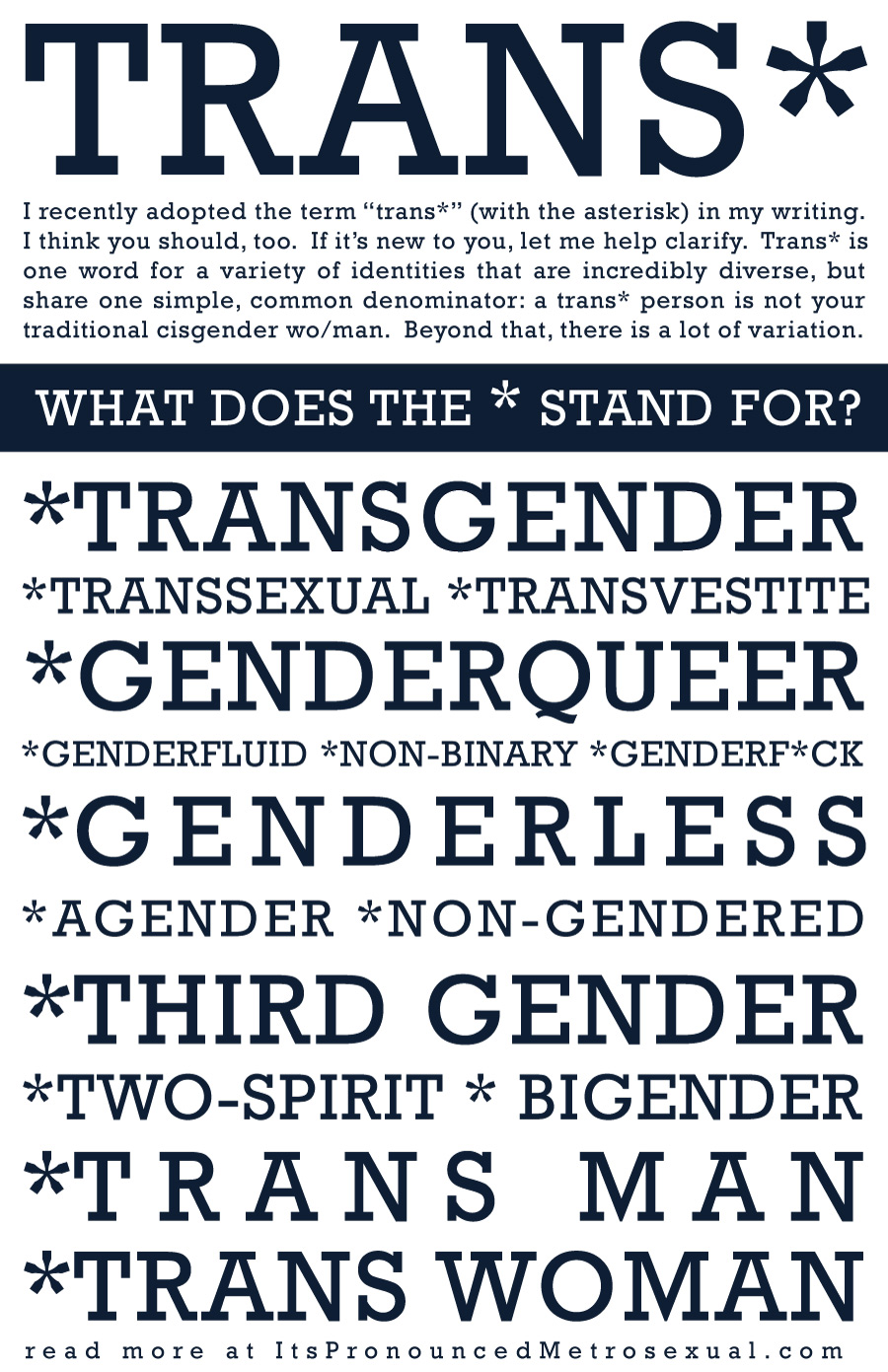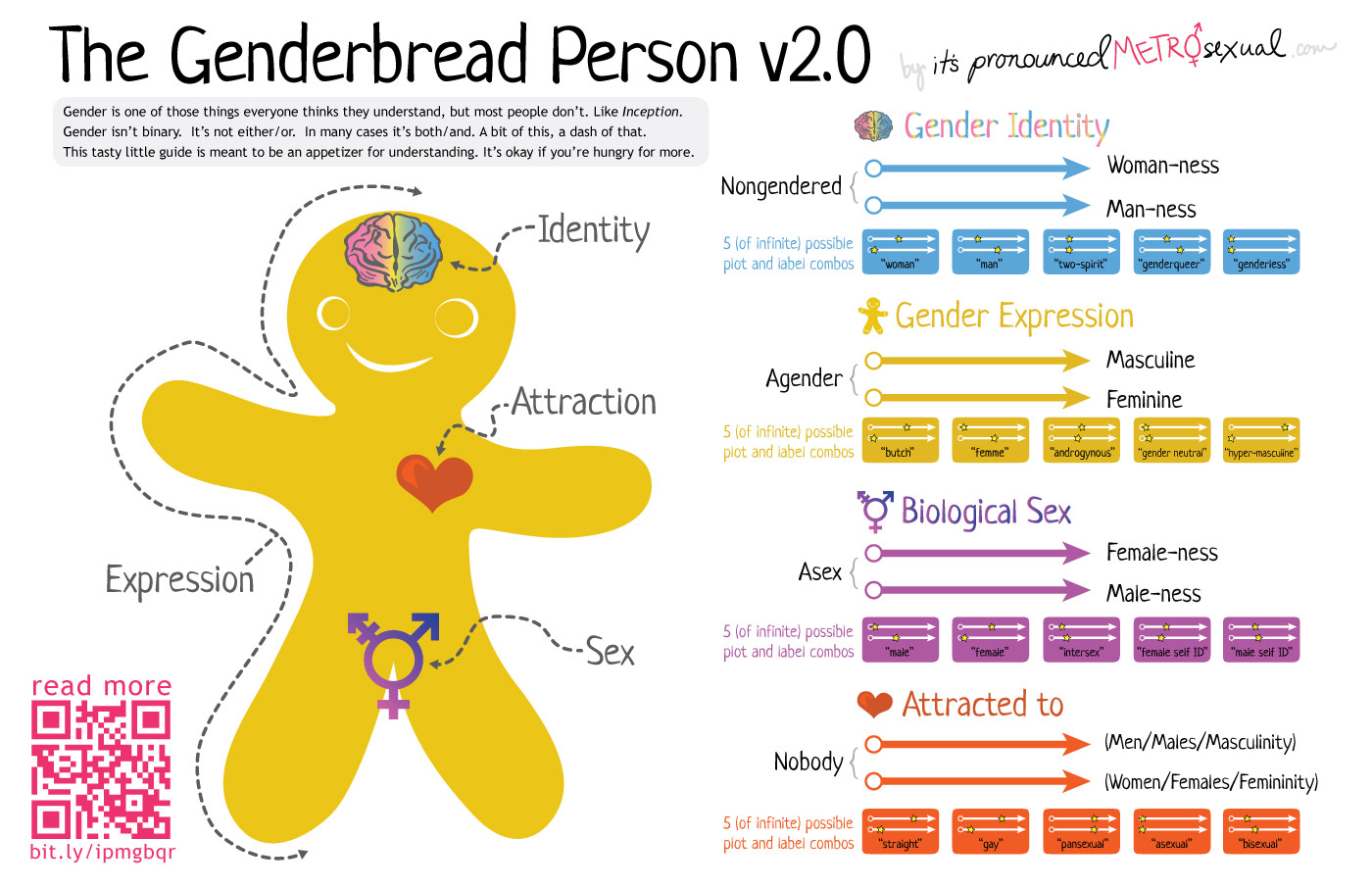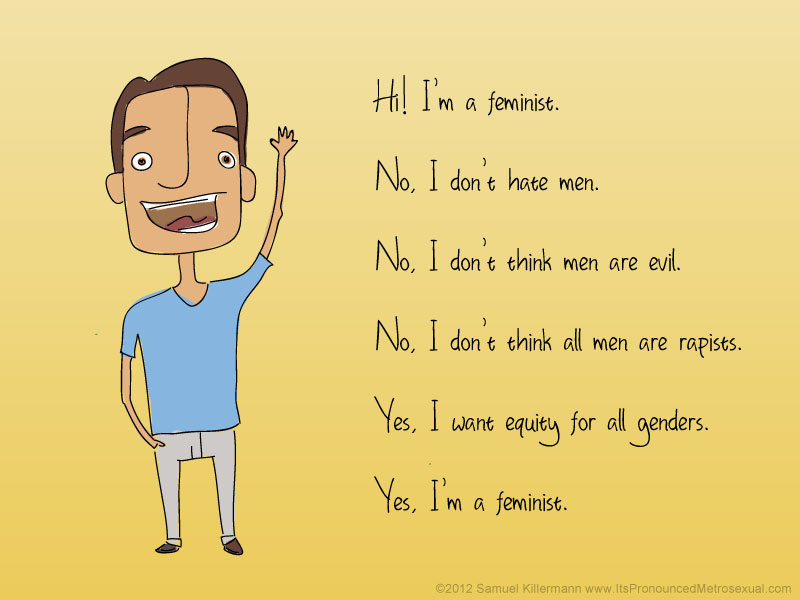First up, is
Gender:
- Which refers to the rules, norms, customs, and practices through which biologically associated differences (e.g. primary sex characteristics-note: link NSFW, secondary sex characteristics-note: link NSFW, chromosomal sex-note: link SFW, etc.) between people are translated into socially constructed differences between men and women, and boys and girls. These socially constructed differences award unequal value, opportunities and life chances to people based upon their gender.
- Despite the fact that history and anthropology suggest that human conceptualization of gender has not always been binary, many modern cultures understand gender as either/or, female or male. Socialization in the culture of this binary understanding starts quite early:
So what is this "cisgender" construct I've heard about here and there?
Cisgender:
- Refers to someone who identifies as the gender/sex they were assigned at birth. For example, someone whose birth certificate says female, and who identifies as a female woman is cisgender.
Are there people who aren't cisgender? Yup, they're called:
Transgender:
- Or someone whose gender identity is different from the gender assigned at birth.
- Other terms used for non-cisgender folk are genderqueer, agender, intersex, genderfluid, bigender, third gender, two-spirited, and more. Each of these terms has their own, nuanced meaning.
- Trans + an asterisk (trans*) is sometimes used when discussing issues that apply to the greater trans* community--or the community of people who are not ciswomen or cismen.
People sometimes talk about gender identity and gender expression. What's the difference?
Gender identity:
- Is someone's internal, felt and known sense of her/his/zer gender, as well as how she/he/ze expresses her/him/zerself.
Gender expression:
- Is about how we demonstrate our gender through the ways we dress, behave, and interact with others.
- Gender expression is not necessarily static--that is, it may change from situation to situation, day by day, etc. Moreover, gender expression is not always conscious, or intentional.ou demonstrate your gender through the ways you act, dress, behave, and interact–whether that is intentional or unintended - See more at: http://itspronouncedmetrosexual.com/2011/11/breaking-through-the-binary-gender-explained-using-continuums/#sthash.NqGB74DG.dpufyou demonstrate your gender through the ways you act, dress, behave, and interact–whether that is intentional or unintended. - See more at: http://itspronouncedmetrosexual.com/2011/11/breaking-through-the-binary-gender-explained-using-continuums/#sthash.NqGB74DG.dpuf
So what is sexism, then?
Sexism:
- Is discrimination against women, as well as the attitudes, stereotypes, and the cultural elements that promote this discrimination.
- Given the historical and continued imbalance of power between women and men, where men as a group are significantly privileged over women as a group, sexism is gender-based prejudice plus power.
- Therefore, women cannot be sexist towards men because women do not have the institutional power that men have. Women can, however, be prejudiced towards men, as prejudice does not require institutional power.
I sometimes hear people talk about patriarchy. They usually don't sound pleased. What's patriarchy?
Patriarchy:
- Literally means "rule by the father," or "father rule." The term was coined by ancient Greek culture, though the system of patriarchy existed before then.
- In current times, patriarchy refers to institutionalized sexism--wherein the vast majority, if not all the power of a culture is held by adult men.
- Most developed, modern cultures are patriarchal to a greater or lesser extent.
Where does feminism fit into all this? Do feminists really hate all men?
Feminism:
- is a political theory and movement to end sexism, sexist exploitation, and oppression. It is NOT a political theory about hating or vilifying men.Women, men, and everyone in between can be feminists.
- In the feminist struggle, internalized sexism and other systems of oppression often divide women and pit them against each other. Thus, “[s]isterhood [cannot] be powerful as long as women [are] competitively at war with one another” (bell hooks, 2000, Feminism is for Everybody).
- Therefore, becoming sisters and brothers in feminist struggle requires confronting not only the ways men dominate and exploit women, but also "the ways women--through sex, class, and race--dominat[e] and exploi[t] other women" (bell hooks, 2000, Feminism is for Everybody).
Any time I've seen trans* people in popular media, there's usually someone mad at them, or trying to hurt them. What's that all about?
Transphobia:
- Is the irrational fear of, and/or hostility towards, people who are transgender or who otherwise transgress traditional gender norms.
- Though humans have had non-binary gender for likely as long as there have been humans, many cultures in the last millenium or so have conceptualized gender as binary, and allowed little wiggle-room for non-gender conforming individuals.
- This binary conceptualization, combined with elements of heterosexism and homophobia, has been institutionalized into transphobia.
Male privilege:
- Is a set of privileges that are societally awarded to men as a class due to their institutional power in relation to women as a class.
- While every man experiences privilege differently due to his other intersecting identities and their position in the social hierarchy (e.g. is he a white man? a man with a disability?), every man, by virtue of being read as male by society, benefits from male privilege.
- For example:
Cisgender privilege:
- is experienced by both cismen and ciswomen. Cisgender privilege is the numerous benefits that many societies and cultures award to people whose biological sex assigned at birth corresponds with their felt sense of gender identity.
- Check out Sam Killermann's list of 30+ examples of cisgender privilege.
Street harassment:
one of the most pervasive forms of gender-based violence and one of the
least legislated against. Comments from “You’d look good on me” to
groping, flashing and assault are a daily, global reality for women and
LGBTQ individuals. But it is rarely reported, and it’s culturally accepted
as ‘the price you pay’ for being a woman or for being gay. At
Hollaback!, we don’t buy it. - See more at:
http://www.ihollaback.org/about/#sthash.a21cBMl8.dpuf
one of the most pervasive forms of gender-based violence and one of the
least legislated against. Comments from “You’d look good on me” to
groping, flashing and assault are a daily, global reality for women and
LGBTQ individuals. But it is rarely reported, and it’s culturally accepted
as ‘the price you pay’ for being a woman or for being gay. At
Hollaback!, we don’t buy it. - See more at:
http://www.ihollaback.org/about/#sthash.a21cBMl8.dpuf
one of the most pervasive forms of gender-based violence and one of the
least legislated against. Comments from “You’d look good on me” to
groping, flashing and assault are a daily, global reality for women and
LGBTQ individuals. But it is rarely reported, and it’s culturally accepted
as ‘the price you pay’ for being a woman or for being gay. At
Hollaback!, we don’t buy it. - See more at:
http://www.ihollaback.org/about/#sthash.a21cBMl8.dpuf
one of the most pervasive forms of gender-based violence and one of the
least legislated against. Comments from “You’d look good on me” to
groping, flashing and assault are a daily, global reality for women and
LGBTQ individuals. But it is rarely reported, and it’s culturally accepted
as ‘the price you pay’ for being a woman or for being gay. At
Hollaback!, we don’t buy it. - See more at:
http://www.ihollaback.org/about/#sthash.a21cBMl8.dpuf
- Which is any comment or action between strangers in public places that is unwelcome, disrespectful, threatening and/or harassing. More often than not, street harassment is motivated by sexism, heterosexism, and/or homophobia.
- For many women and LGBT individuals, the verbal assaults, flashing, and/or groping of street harassment is a daily reality.
- Socioeconomic class and/or geographic location may somewhat moderate the effects of street harassment, as a great deal of it occurs in public places such as bus stops, train stations, cities where walking/taking public transit is easier than driving, etc.
Finally, other macroaggressive forms of gender-based harassment and oppression are
one
of the most pervasive forms of gender-based violence and one of the
least legislated against. Comments from “You’d look good on me” to
groping, flashing and assault are a daily, global reality for women and
LGBTQ individuals. But it is rarely reported, and it’s culturally accepted
as ‘the price you pay’ for being a woman or for being gay. At
Hollaback!, we don’t buy it. - See more at:
http://www.ihollaback.org/about/#sthash.a21cBMl8.dpuf
one
of the most pervasive forms of gender-based violence and one of the
least legislated against. Comments from “You’d look good on me” to
groping, flashing and assault are a daily, global reality for women and
LGBTQ individuals. But it is rarely reported, and it’s culturally accepted
as ‘the price you pay’ for being a woman or for being gay. At
Hollaback!, we don’t buy it. - See more at:
http://www.ihollaback.org/about/#sthash.a21cBMl8.dpuf
one
of the most pervasive forms of gender-based violence and one of the
least legislated against. Comments from “You’d look good on me” to
groping, flashing and assault are a daily, global reality for women and
LGBTQ individuals. But it is rarely reported, and it’s culturally accepted
as ‘the price you pay’ for being a woman or for being gay. At
Hollaback!, we don’t buy it. - See more at:
http://www.ihollaback.org/about/#sthash.a21cBMl8.dpuf
Slut-shaming: - Slut-shaming, also known as slut-bashing, is the cultural practice of shaming and/or attacking a woman or a girl for simply being sexual, having one or more sexual partners, acknowledging sexual feelings, and/or acting on sexual feelings.
- More simply, slut-shaming is “publicly or privately [insulting] a woman because she expressed her sexuality in a way that does not conform with patriarchal expectations for women” (Kat, Slut-Shaming vs. Rape Jokes).
- This is damaging not only to the girls and women targeted, but to women in general and society as a whole.
- Though terms such as "slut," "whore," etc. are often used to refer to women who have sex--regardless of how much of what kind of sex under what circumstances--slut-shaming can and often does occur without the verbal usage of the term "slut."
Rape culture:
- At its core, a rape culture is a complex set of conscious and unconscious beliefs that encourages male sexual aggression and supports violence against women.
- Rape culture occurs in societies where violence is seen as sexy and sexuality as violent.
- In a rape culture, women accurately perceive a continuum of threatened violence that ranges from sexual remarks to sexual touching to rape itself. This perception often governs women's lives in a plethora of ways, ranging from how they travel, who they associate with, what kind of job they might take, and more.
- A rape culture condones physical and emotional terrorism against women as the norm.
- In a rape culture both men and women assume that sexual violence is a fact of life, inevitable as death or taxes. This violence, however, is neither biologically nor divinely ordained.
- Rape culture is also telling girls and women to be careful
- about what you wear
- how you wear it
- how you carry yourself
- where you walk
- when you walk there
- with whom you walk
- whom you trust
- what you do
- where you do it
- with whom you do it
- what you drink
- how much you drink
- whether you make eye contact
- if you’re alone
- if you’re with a stranger
- if you’re in a group
- if you’re in a group of strangers
- if it’s dark
- if the area is unfamiliar
- if you’re carrying something
- how you carry it
- what kind of shoes you’re wearing in case you have to run
- what kind of purse you carry
- what jewelry you wear
- what time it is
- what street it is
- what environment it is
- how many people you sleep with
- what kind of people you sleep with
- who your friends are
- to whom you give your number
- who’s around when the delivery guy comes
- to get an apartment where you can see who’s at the door before they can see you
- to check before you open the door to the delivery guy
- to own a dog or a dog-sound-making machine
- to get a roommate
- to take self-defense
- to always be alert
- always pay attention
- always watch your back
- always be aware of your surroundings
- and never let your guard down for a moment lest you be sexually assaulted
- and if you are and didn’t follow all the rules it’s your fault.
- Do you think men have to live by these rules? Yeah. Me neither.







0 comments:
Post a Comment